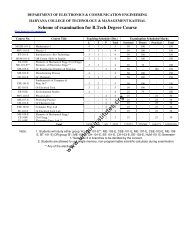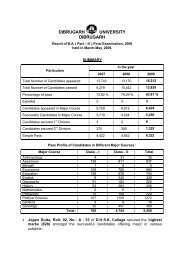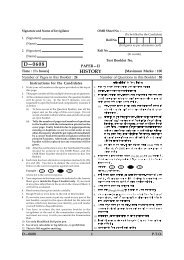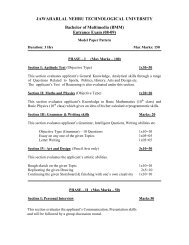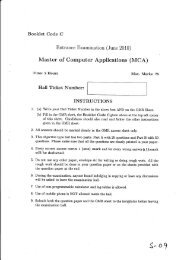UNIT – I Lesson 1 HRM – AN OVERVIEW Lesson Outline Nature of ...
UNIT – I Lesson 1 HRM – AN OVERVIEW Lesson Outline Nature of ...
UNIT – I Lesson 1 HRM – AN OVERVIEW Lesson Outline Nature of ...
Create successful ePaper yourself
Turn your PDF publications into a flip-book with our unique Google optimized e-Paper software.
enabling them to concentrate on more important matters, delegation improves quality <strong>of</strong><br />
decisions, by moving the decision-making closest to the scene <strong>of</strong> activity.<br />
Delegation improves motivation, initiative and creativity and also helps out in the<br />
development <strong>of</strong> managers in the junior echelons <strong>of</strong> organizations by exposing them<br />
adequately towards complex decision-making. However might be the beneficial outcomes<br />
<strong>of</strong> delegating, there are common barriers to delegation. Reluctance to part with power and<br />
over-confidence <strong>of</strong> the supervisors and a belief that no one else can do the task better than<br />
them, are a few <strong>of</strong> the barriers at the level <strong>of</strong> the delegating administrator. It takes courage<br />
to delegate because delegation does not absolve one from the ultimate responsibility.<br />
Often it is seen that responsibility is feared as much as authority is sought after.<br />
At the recipient’s level, the barriers could be due to inequitable distribution <strong>of</strong><br />
work and the resultant overburden, or fear <strong>of</strong> failure, fear <strong>of</strong> premature display <strong>of</strong><br />
inadequacies <strong>of</strong> oneself, lack or trust in the motives behind delegation, or merely a lack <strong>of</strong><br />
motivation or perceived incompetence on the part <strong>of</strong> the person who has to fulfill the<br />
requirements in terms <strong>of</strong> the delegated tasks. According to Mishra, M.N. (2001),<br />
“delegation would be successful where a wide range <strong>of</strong> people are involved, where the<br />
work provides intrinsic job satisfaction, the work group members accept the<br />
management’s objectives, the employee-employer relations are harmonious, consistency<br />
and coordination are prevalent, and where technology permits individual autonomy and<br />
subordinates welcome responsibility.”<br />
Delegation would be possible only if the higher authority possesses willingness to<br />
trust the subordinates and to allow them to make mistakes and learn from the process. If a<br />
manager clearly delegates authority to undertake a well-defined task, a properly trained<br />
subordinate can get it done with a minimum <strong>of</strong> the supervisor’s time, attention and<br />
involvement. In the context <strong>of</strong> delegation, managers need to accept that there are several<br />
ways to complete a job and that their own ways <strong>of</strong> solving them are not necessarily those<br />
that their subordinates would choose. Superiors could be induced to delegate more by<br />
making them part <strong>of</strong> the team’s performance rather than their own. Where there is a<br />
system <strong>of</strong> appraisal <strong>of</strong> the superiors by the subordinates, a parameter for appraisal should<br />
the formers’ inclination to help the latter through delegation and empowerment.<br />
The practice <strong>of</strong> empowering and delegation challenges managers and employees<br />
alike to pay close attention to the terms <strong>of</strong> their working relationships. Delegation has to<br />
be preceded by careful planning about what tasks could be delegated and in what<br />
sequence. Decisions on who should get the assignment should be based on their workload<br />
and competence. People should be given sufficient resources for carrying out the delegated







